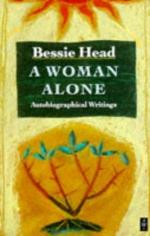
|
| Name: _________________________ | Period: ___________________ |
This test consists of 15 multiple choice questions and 5 short answer questions.
Multiple Choice Questions
1. In old African custom, what were women forbidden to handle?
(a) Goats.
(b) Ivory.
(c) Cattle.
(d) Silk.
2. According to an account by Dr. W.H.C. Lichtenstein, Botswana men only do work that can be what?
(a) Sold or traded.
(b) Considered too important for women.
(c) Dropped suddenly.
(d) Viewed as manly.
3. In Chapter 2, Bessie states that Botswana has survived by what?
(a) Sheer luck.
(b) Having few whites.
(c) Lack of violence.
(d) The grace of God.
4. Bessie views the author, Pasternak, as the liberator of what?
(a) Children.
(b) Russia.
(c) Emotions.
(d) Passion.
5. What is the meaning of "didactic" works?
(a) Historical, yet fiction.
(b) Dealing with African culture.
(c) Pre-planned conclusions and principles.
(d) Geographical works.
6. In 1968, where was Bessie told that South African literature wasn't very popular?
(a) United States.
(b) England.
(c) Poland.
(d) Germany.
7. Bessie says that people in Botswana lead very what lives?
(a) Quiet.
(b) Unassuming.
(c) Rebellious.
(d) Secure.
8. In Chapter 2, what did the British go to Rhodesia to find?
(a) Schooling.
(b) Work.
(c) Gold.
(d) Relaxation.
9. What is the result of the casual sexual practices of the men of Botswana?
(a) High rate of illegitimate births.
(b) AIDS epidemic.
(c) Rise in alcoholism.
(d) More poverty.
10. In "African religions," Bessie states that African religion doesn't receive value because they don't have what?
(a) Money for recruiting followers.
(b) Large congregations.
(c) Deity figurines to worship.
(d) Ornate houses of worship.
11. Bessie states that one day all nations shall dwell under what shadow?
(a) Peace.
(b) Global civilization.
(c) The Pharaoh's.
(d) Total equality.
12. By the 1830's, most of the tribes of South Africa were what?
(a) Assimilated into other tribes.
(b) Landless.
(c) Extinct.
(d) Christians.
13. Bessie feels that literature in South Africa is very what?
(a) Functional.
(b) Soothing.
(c) Rebellious.
(d) Necessary.
14. How many major tribes are there in Botswana?
(a) 5.
(b) 4.
(c) 2.
(d) 3.
15. According to Bessie in "African religions," what is at the root and foundation of African religion?
(a) Sacrifice.
(b) Prayer.
(c) Family.
(d) Communal goodness.
Short Answer Questions
1. In "Notes on novels," how is pre-colonial invasion South Africa described?
2. In Chapter 2, whose religious ideas hold great appeal for Bessie?
3. In "Makeba music," Bessie states that she believes in what?
4. In Chapter 2, Bessie believes that God is embodied in whom?
5. What writer does Bessie quote in "Social and political pressures . . ."?
|
This section contains 381 words (approx. 2 pages at 300 words per page) |

|




